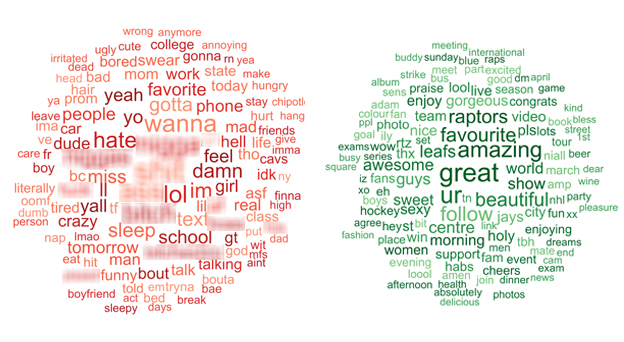Canadians more upbeat than US neighbours, at least on Twitter

A word cloud of American tweets, left, versus those tweeted from Canada. Some of the strongest language has been blurred out.
We watch the same TV shows, listen to the same music and wear the same clothes. But when it comes to what we say on Twitter, Canadians and Americans could hardly be more different.
After analyzing millions of tweets, McMaster linguists have found that Canadians tend to be a pretty polite, happy bunch of tweeters.
They also found that our neighbours’ tweets tend to be a little more, uh, raunchy.
PhD Candidates Daniel Schmidtke and Bryor Snefjella compiled more than three million geo-tagged tweets from February to October 2015. They then deleted words such as “a”, “the” and “to” and looked at what was left over.
Disproportionately “Canadian words” included “great”, “amazing”, “beautiful” and “favourite”. “Habs” and “Leafs” were both prevalent, as were “Raptors” and “Jays”. Ditto for “hockey” and “eh”.
And the most disproportionately “American words”? Well, most can’t be printed here, but they include a host of curse words, off-colour slang and even a racial slur.
Some of the less colourful, but just as negative words include “hate”, “hell”, “tired”, “hurt” and “annoying”.
“We could see the difference between the two countries’ tweets as soon as we created a word cloud of the findings,” says Schmidtke, who conducted the research in McMaster’s Sherman Centre.
In the news:
The polite Canadian is no stereotype. Tweets prove this (Huffington Post)Study shows Canadians are more polite than Americans on Twitter (Global News)
Canadians really are nicer than Americans…on Twitter (MetroNews Canada)
Finally! Science proves that Canadians are way more polite than Americans (Vox)
The pair is among the first researchers to use the social network to study geo-linguistic differences between neighbouring countries where English is the primary language spoken.
They also analyzed tweets from England and Scotland and found less surprising differences in the way people in those countries share their thoughts.
For instance, English tweeters tended to use the word “small”, while those in Scotland used the word “wee”.
Those in England used the word “good” where those in Scotland wrote “gid”.
The researchers also found that the “lexical border”, where language is the most similar, has crept north of the actual border between England and Scotland.
“It suggests that the English way of writing and saying things is spreading into Scotland,” says Schmidtke.
Schmidtke and Snefjella work in linguist Victor Kuperman’s lab, where researchers are mining the web for findings that could impact everything from government policy to how we understand our global neighbours.
“People exchange massive quantities of language and information every second of the day, and that big data is right there waiting to be analyzed,” says Kuperman.
